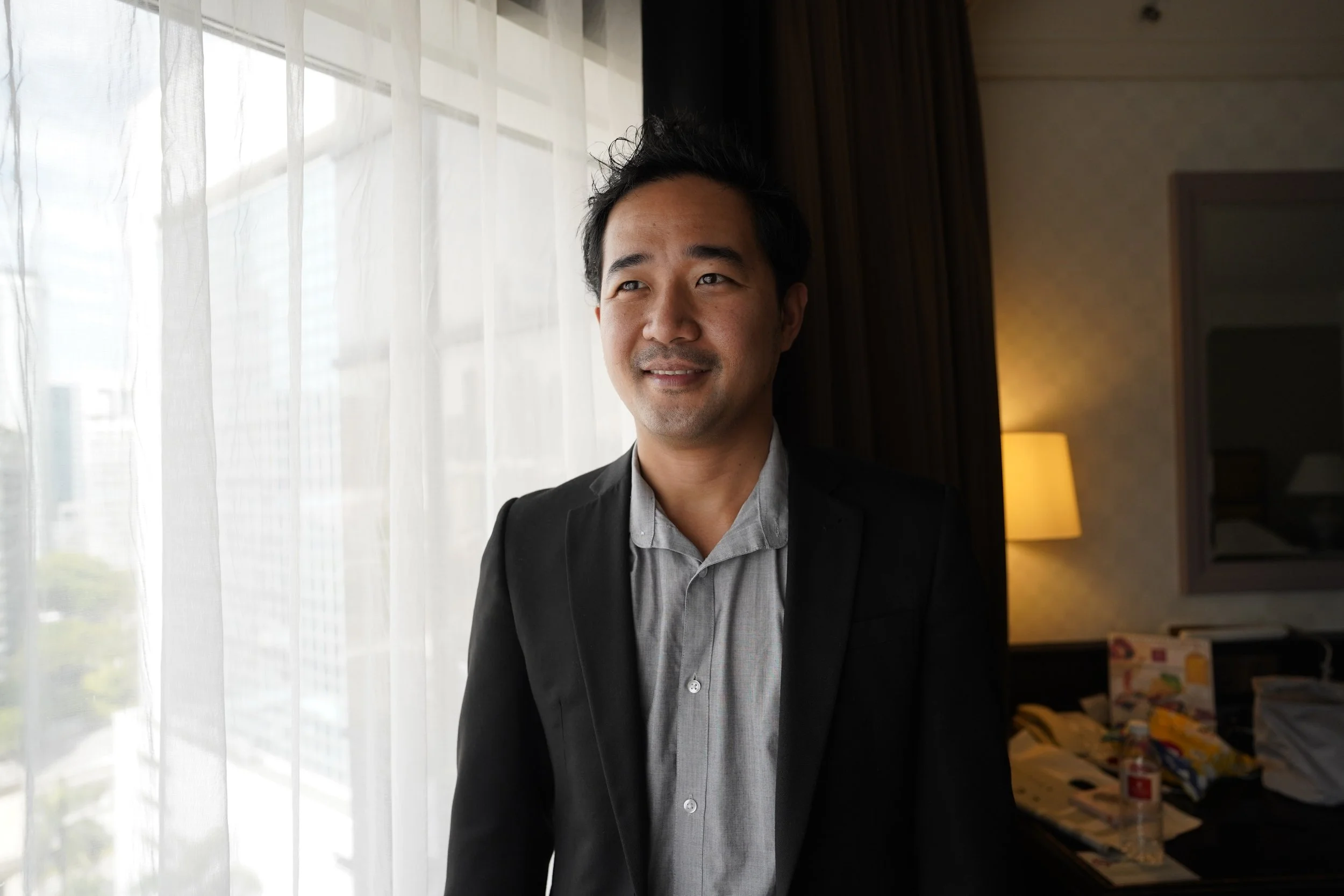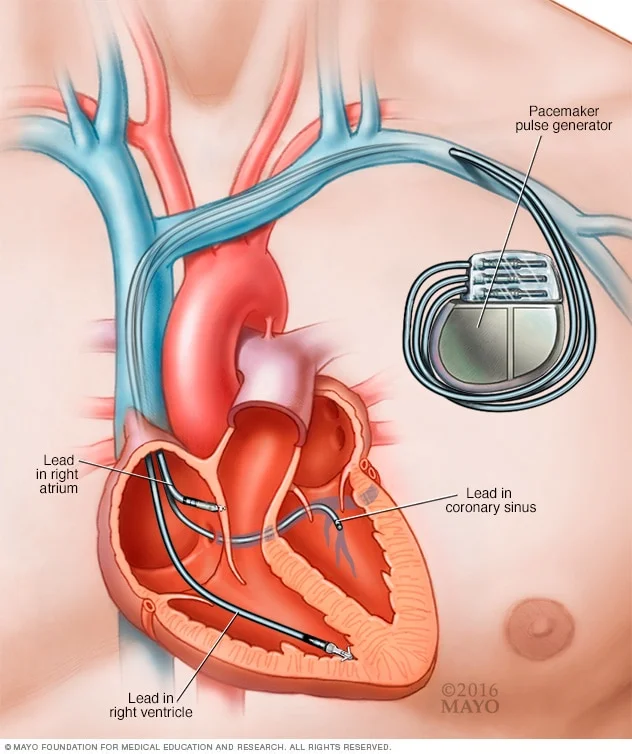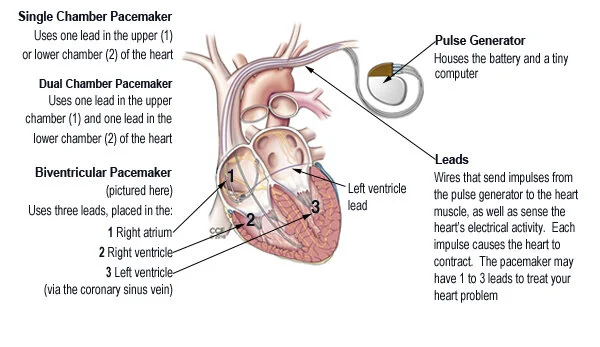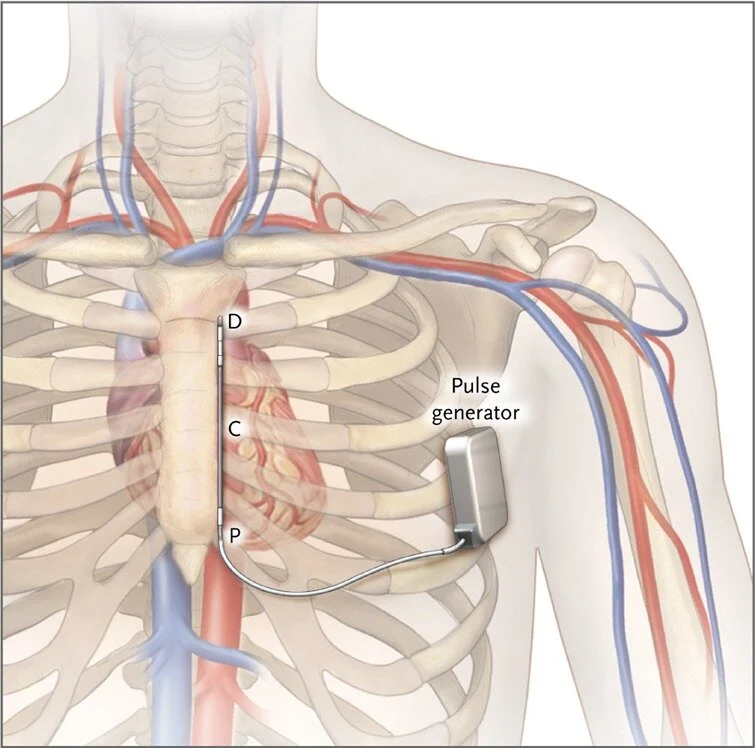Permanent Pacemaker (PPM, ICD, CRT)
What is a pacemaker?
A pacemaker is a device that sends small electrical impulses to the heart muscle to maintain a suitable heart rate or to stimulate the lower chambers of the heart (ventricles). A pacemaker may also be used to treat fainting spells (syncope), congestive heart failure and hypertrophic cardiomyopathy.
PACING MODE
Pacing mode is declared by an abrreviation consisting of 3 to 5 letters. These letters describe, in chronological order, the following:
The chamber paced: O (omitted), A (atrium), V (ventricle), or D (dual, atria and ventricles)
The chamber sensed: O (omitted), A (atrium), V (ventricle), or D (dual, atria and ventricles)
Response to sensed events: O (omitted), I (inhibited), T (triggered) or D (dual, inhibited and triggered)
Rate responsiveness: O (omitted, none) or R (rate responsive)
Multisite pacing (pacing in multiple places in the same chamber: O (omitted), A (atrium), V (ventricle), or D (dual, atria and ventricles)
If the pacemaker is not rate responsive, then the fourth letter may be omitted. This also applies to the fifth letter (multisite pacing).
Example: DDDR pacemaker:
D = Dual pacing (pacing in the atria and ventricles)
D = Dual sensing (sensing in the atria and ventricles)
D = Dual response (can be both inhibited and triggered)
R = Rate responsive (the pacing rate can be adapt to physical activity)
In clinical practice, DDD, VVI, and AAI are the most common, with or without rate responsiveness.
Done under Mild-Moderate Sedation
Basic Kits:
1 Barts Device Pack
2 Chloraprep (10mL)
1 Ioban
1 Medium Image Intensifier cover
1 Diathermy pen
1 scratch pad
1 500mL NaCL bag (sterile)
Sutures: (operator preference)
1 Ethibond (for securing leads)
1 Vicryl tie (for cephalic approach)
1 PDS 2-0 or 3-0, or monocryl 3-0, or vicryl 2-0 (for deep tissue curve suture)
1 Monocryl curve 4-0 or 3-0, or Monocryl straight 3-0 (for skin suturing)
1 Steristrip
1 Softpore dressing
Note: If Lead Revision/Box Change use plasma blade instead of diathermy + scratch pad (plasma blade doesn’t need scratch pad)
If CRT/HIS Pacing: (Basic kits + additional equipment)
1 Shoulder Rad Pad
1 20ml Luer lock
1 Small trolley cover
1 Terumo 150cm or 180cm
1 Angioplasty wire (ChoICE PT ES or floppy)
1 Bowl with pure contrast (small bowl) - for small injection to locate branches
If Device Extraction (Basic kits + addtional equipment)
1 Shoulder Rad Pad
1 Small trolley cover
1 Terumo 150cm or 180cm
1 Big swabs (warings)
extra non-absorbable sutures (usually ethibond/silk)
For S-ICD Implant (Basic kits + addtional equipment)
Note: usually done under General Anaesthetic but if MD wants to do it under nerve block, they will need:
1 Peripheral Ultrasound
1 Probe cover
2 Chloraprep (Large)
1 Nerve block needle with 2 ports
Chirocaine (Levobupivacaine), Marcaine, Lidocaine
*need special arm board to abduct the left arm, INCOPAD - to secure arm on the arm board
*special drape - 5pcs drape (arm, 2 sides, 1 leg, 1 head)
*additional sutures:
2 Ethibonds
2 PDS 2-0 or 3-0, or monocryl 3-0, or vicryl 2-0 (for deep tissue curve suture)
2 Softpore dressings
Special Thanks to Kimberlie Mae Garcia
Vein Access:













